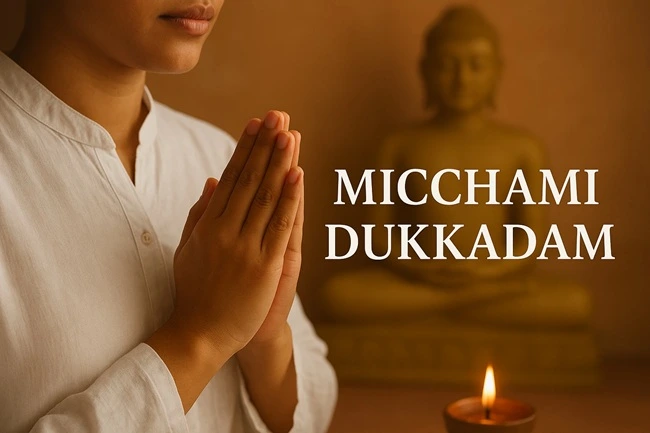In the Jain faith, forgiveness is not just a virtue, it is a way of life. One of the most beautiful traditions that reflects this philosophy is Micchami Dukkadam Day, observed by Jains after the conclusion of Paryushana Parva, one of the holiest festivals in Jainism. On this day, Jains seek forgiveness from friends, family, acquaintances, and even strangers for any hurt caused knowingly or unknowingly during the past year.
The essence of this day lies in humility, reconciliation, and the belief that forgiving and seeking forgiveness helps cleanse the soul. Let’s explore what Micchami Dukkadam really means, why it is celebrated, and how Jains observe this sacred day.

What Does Micchami Dukkadam Mean?
The words “Micchami Dukkadam” come from the Prakrit language, an ancient script used in Jain texts. It is a phrase deeply rooted in Jain philosophy of forgiveness.
- Micchami = “May all my bad deeds turn fruitless or nullified.”
- Dukkadam = “Any wrong or hurt caused to you.”
Together, Micchami Dukkadam means:
“If I have caused you any pain or hurt, knowingly or unknowingly, in thought, word, or action, may those misdeeds become fruitless, and I seek your forgiveness.”
It is not just a greeting but a heartfelt plea for reconciliation and a commitment to live with compassion.
Why is Micchami Dukkadam Day Celebrated?
The celebration of Micchami Dukkadam is closely tied to Paryushana Parva, an eight-day festival (for Shwetambar Jains) or ten-day festival (for Digambar Jains). Paryushana is a period of deep spiritual reflection, fasting, self-discipline, and repentance.
At the conclusion of Paryushana, Jains perform Pratikraman – a ritual of introspection and repentance for mistakes made during the year. After this, they extend their apologies to all beings around them with the phrase “Micchami Dukkadam.”
The purpose of this day is:
- To seek forgiveness from every soul.
- To cleanse oneself of grudges, anger, or resentment.
- To promote harmony, peace, and compassion in society.
- To strengthen human relationships through humility and reconciliation.
What Happens on Micchami Dukkadam Day?
On this day, Jains wholeheartedly engage in seeking and granting forgiveness. Some of the key practices include:
- Pratikraman Ritual
- Jains gather in temples or at home to perform Pratikraman, a prayer where they confess their mistakes, repent, and resolve to avoid them in the future.
- Seeking Forgiveness from Loved Ones
- People reach out to family members, relatives, colleagues, neighbors, and friends.
- With folded hands and a humble heart, they say “Micchami Dukkadam” in person, over phone calls, or even messages.
- Universal Forgiveness
- Forgiveness is not limited to known individuals. Jains seek pardon from all living beings – humans, animals, and even nature – recognizing that harm can occur knowingly or unknowingly.
- Acts of Reconciliation
- Disputes are resolved, misunderstandings are cleared, and relationships are healed.
How is Micchami Dukkadam Celebrated?
The celebration is more spiritual than festive. It involves:
- Temple Visits: Many Jains visit temples to participate in Samvatsari Pratikraman, the annual ritual of repentance.
- Family Gatherings: Families come together, share forgiveness, and reaffirm their commitment to living peacefully.
- Digital Era Forgiveness: In today’s world, Jains also share Micchami Dukkadam messages on WhatsApp, social media, and emails to extend apologies beyond geographical barriers.
- Fasting and Reflection: Many observe fasting or eat simple satvik food to maintain purity in body and mind.
Spiritual Significance of Micchami Dukkadam
Micchami Dukkadam is not just about words – it is about cleansing the soul from bitterness. According to Jain philosophy:
- Forgiving others eliminates anger and ego.
- Seeking forgiveness reduces guilt and emotional burden.
- It helps an individual walk on the path of Ahimsa (non-violence) and Aparigraha (non-possessiveness).
- It ensures one enters the next year with a light heart, free of grudges.
Lessons We Can All Learn from Micchami Dukkadam
Even beyond religion, the essence of Micchami Dukkadam holds universal value:
- Relationships become stronger when we forgive and let go.
- Apologizing does not lower one’s dignity but elevates it.
- A society built on compassion and forgiveness will always flourish in peace.
Conclusion
Micchami Dukkadam Day is one of the most meaningful traditions in Jainism, reminding us that forgiveness is the highest form of strength. On this day, Jains seek forgiveness from every being, ensuring that they do not carry forward anger or grudges.
In a world full of stress and conflicts, the message of Micchami Dukkadam is timeless – forgive, seek forgiveness, and live with harmony.
So, as the Jains say with folded hands and humility:
“Michhami Dukkadam” – If I have hurt you in any way, knowingly or unknowingly, I seek your forgiveness.”
FAQs on Micchami Dukkadam
Q1. What is the exact meaning of Micchami Dukkadam?
It means “May all the harm I have caused you, knowingly or unknowingly, be nullified. I seek your forgiveness.”
Q2. When is Micchami Dukkadam celebrated?
It is observed on the last day of Paryushana Parva – known as Samvatsari – in the Jain calendar.
Q3. Is Micchami Dukkadam only for Jains?
While rooted in Jainism, its essence of forgiveness is universal. Anyone can embrace this philosophy.
Q4. How do people usually celebrate this day?
Through prayers, pratikraman, fasting, temple visits, and seeking forgiveness from loved ones.
Q5. Why is forgiveness so important in Jainism?
Forgiveness purifies the soul, reduces karmic burden, and aligns one with the path of non-violence and spiritual growth.
For more such Spirituality Update, Follow Popnewsblend.com.

Hi, I’m Prashant Jain — a curious soul, storyteller, and content creator at heart.I’ve always been drawn to the world of entertainment, travel, sports, health & lifestyle — not just as a writer, but as someone who genuinely lives these experiences. Whether I’m binge-watching the latest OTT series, exploring offbeat spiritual destinations in India, or diving deep into wellness routines and cricket match insights, I love sharing what I discover with like-minded readers.
PopNewsBlend is my way of blending personal journeys with meaningful stories — ones that inform, inspire, and keep you ahead of the curve. Everything I write comes from real observations, hands-on experiences, and a deep passion for understanding the world around us.
Discover more from Popnewsblend
Subscribe to get the latest posts sent to your email.







